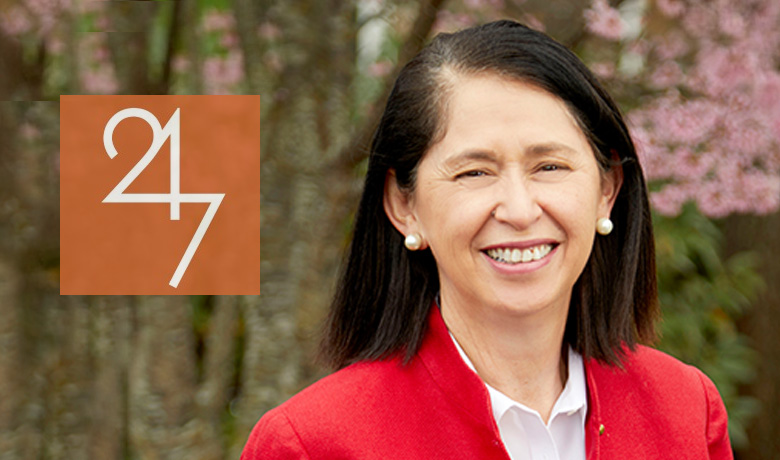
BITAC Owners 2025 Panel: AI and the Guest of 2030, Part 1
By Jim Nelson | June 30, 2025
BITAC, the executive event-producing sister company of Hotel Interactive, recently held its annual Owners event with hoteliers from across the nation. One panel discussion, which dove into AI — the topic on the tips of tongues everywhere — was moderated by Jenn Parks, vice president of Curator Resort & Hotel Collection; her panelists included Cody Adent, president/CFO of Vibrant Management; Ron Pohl, president of WorldHotels and International Operations for BWH Hotels; Sondra Storm, principal of Embarcadero Hospitality Group; and Russ Urban, CEO/principal of Electra America Hospitality Group.
Parks opened the conversation by asking the panelists how they foresee AI transforming the hospitality industry by 2030.

CODY ADENT: Now that we’re gathering so much data that I think that in the ways that we use AI today, we don’t even know what the capabilities will be in 2030, but I think what we’ll find is that through business intelligence, these AI platforms will be able to say, “Ron, every time you stay with us, you request this room, and as soon as you get there, you always book a spa package, and you always hit our golf course. So, we’re just going to prebook those for you. If that doesn’t work with your schedule, let us know, and we’ll cancel them.” So, I think AI is going to create the guest experience that they would already be in pursuit of before they even have to do it. So, we’re going to know what the guest is looking for and provide that experience before they even have to make a reservation, call the spa, request that upgrade. It will already be done for them because we know based on trends that’s how they like to stay with our properties.
RON POHL: As an industry, we’re already behind customer expectations. I think retail has really provided the direction, and Amazon’s probably the best example of that. They know everything about us. They know when we should be reordering something. They make it simple, and our guests tell us the same thing: “You should already know what my preferences are and use it.” I’m amazed that Cody already knew my preferences, and I didn’t even tell him [laughter]. That’s what customers coming into our hotels today are saying, “Why do I have to give you the same information that I like a king room on the third floor?” It’s all about the data that we have and then integrating that into the systems that we’re creating. We speak about it as technology being the enabler; AI is one component of that, but how do you use them at the right time in the right place, like you do with revenue management? There is a specific time for AI, and there’s a time when you don’t use AI, and how we integrate that is critically important to guest satisfaction.
JENN PARKS: And not lose the human connection.
SONDRA STORM: I asked ChatGPT this question. What it said is, “Great question, and one that’s especially relevant given your work in high-end boutique, high-touch hospitality. AI can be a powerful tool in this space, but it has to be used with intention to enhance, not erode, the soul of hospitality — connection, warmth, and experience.” It goes on [to] talk about personalization at scale, which I think is what Cody was referring to to some degree. We are all about experience with our guests; that’s what helps us stand apart in the space. So, to be able to get more information and get that to our staff to be able to use more effectively to create personalized experiences for guests is huge. And operational efficiency — obviously, forecasting occupancy labor, predicting maintenance for building systems, real time, translation of tools for global staff and guests, enhanced guest communication, and smarter market positioning. It gave me a very thorough answer, an example of how using it can speed up the work that maybe took a long time to do before and help us to think about these things more proactively.

RUSS URBAN: Boy, it’s hard to follow ChatGPT. I can’t believe that ChatGPT has really only been around for two and a half years; it seems like it’s been around forever. So, when I really hone in on what applications it can have — Ron mentioned it a minute ago — I think one of the most powerful uses in our business is going to be AI as it relates to revenue management. It won’t put revenue managers out of business, because you always need smart humans to manage this amazing tool that we have, but I think revenue management is going to be much more sophisticated as AI gets put into place.
JP: Cody and Sondra, maybe this question is more for you: how can smaller or independent properties leverage AI to compete with larger chains?
CA: Our properties are very small, anywhere from five to 50 rooms, and truly independent, but guests have those understandings of what a branded hotel will give them, and they want the same thing from us. We’ve been running our properties virtually for about five years, and AI has become very trendy and cool recently, but I think AI isn’t just the ChatGPT response that Sondra got, it’s also when you can automate something. We’ve been using smart locks for five years, and that’s using AI to create a unique code for every guest. We met Duetto at BITAC five years ago, and we have been using them as well for revenue management, and we use Akia and Talsey AI that allows us to run our properties virtually, which saves us a huge amount on payroll and allows our virtual GMs to manage more than one property, because AI is taking care of so much of the communication, and a lot of it is very easy questions like, “What’s the Wi-Fi, or when is the pool open?” But even Talsey AI, which is a very intuitive AI response, someone asked just recently, “Where should we take our kid to dinner?” It looked it up, it did research, and it said, “I know that you’ve got your eight-year-old with you. There are three different places I’d recommend within walking distance. This one, kids eat free on Tuesdays.” There’s so much capability that allows you to save in payroll and utilize technology and give a great guest experience.
SS: I’d echo that. Our properties range from 22 rooms to 95 rooms; especially at our smaller properties that are 22, 23 rooms, you just don’t have the layers of staff that maybe would make it easier to compete with other options out in the market. Yet a huge part of our identity is great customer service, being very responsive. Similarly, we use AI in our guest communications; that has been really helpful. I have found that you really do need to spend a lot of time, though, shaping it to have the personality and the touch and the thoroughness that you want so that it doesn’t feel cheap, it doesn’t feel like they’re just being brushed off. I had an experience with getting an electric car from a rental car company this weekend and they didn’t tell me it was electric — user error; I should have maybe noted that, but I didn’t — so, I didn’t charge my car in time. I tried to call Budget to get some help because I needed to get back here, and my car didn’t have enough charge in it, and as I was talking on the phone tree with Budget I was so frustrated with AI because it was so unhelpful. It was basically just taking me in a loop and being really rude about it; I’m saying, “Talk to somebody,” and it’s like, “No,” and then hanging up on me. So, you have to spend time really shaping the AI, whether that’s the guest communications or the work that you’re doing. There is an investment up front to make sure that it is actually a reflection of your brand. A huge part of what we do in our identity is customization; a lot of our properties are in wine country, and people come to have these custom experiences, for us to be different and unique, so we will feed ChatGPT our brand guidelines, what our ethos and our values are, and we’ll say, “Come up with some ideas of some unique programming that we could do related to wine tasting,” and it will come up with these cool and interesting ideas. It’s really a tool to support our team to have some creativity when maybe a bigger company could hire a brand company to develop all of that for them. We’ve been able to use that as an effective tool to do some unique and different things.
RU: I think that independent hotels have a real opportunity when it comes to all of the new technologies that AI takes advantage of, because you can be the first properties to actually have a lot of these tools. It will take a while before the big brands allow this kind of thing. So, I think I’d use it, if you’re an independent hotel, as a differentiator, at least for the foreseeable future, to try out new products.
JP: Ron, how do you feel AI can enhance multilingual support in your global hotels in terms of guest communication?

RP: Well, it certainly simplifies the ability to do that, and we struggle with that. I was in Riyadh [Saudi Arabia] last week, and they mandate that if you’re going to operate hotels there, every communication has to be in Arabic. It’s a little more challenging to just change your booking engines to convert to that, and it can’t be just on the landing page; the entire process has to be in Arabic. So, using that type of technology enables us to simplify not only the process itself, but the cost savings that are the necessary investment to make that happen. It truly is a differentiator for us. We’re in over 100 countries around the world and we need 70 different websites to support all of this. Now we can bring all those together into one platform and let the technology do the modifications, rather than us always having to make those changes. If you think about it, you make one change to a room type here you have to then change that in 70 different systems around the world, where now that technology enables us to do it within itself. So, it creates some tremendous efficiency when used right.
CA: Talsey AI is one of our partners, and it will connect through WeChat, and then it converts — I can’t remember how many languages — I think over 70 languages that it’ll automatically go back and forth. So, the end user is just receiving it in their language of choice, and then for our team, who’s also managing the messages, it’ll be converted to English. It gives us a way to interact with all of our international guests that otherwise we would have never had the ability to do.
In part 2 of this article, the panelists will discuss how AI can help properties understand guest behavior to better influence marketing strategies and how to stay ahead of the AI curve, and an audience member will chime in with a very important piece of info about one of the dangers of using AI.





Get involved!
Comments